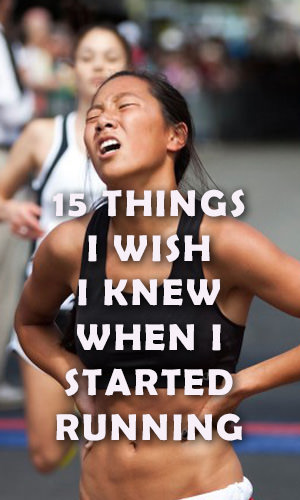
15 Things I Wish I Knew When I Started Running

Posted on 10 May, 2021

It’s pretty easy to learn from your own mistakes. But why even make the mistakes in the first place if you can learn from where others have gone wrong? While running can be as easy as putting one foot in front of the other, it can quickly become a lot more complicated. Do you need special shoes? A coach? What’s the best way to build endurance? How do you prevent injury? Fortunately, the running community is eager to share its collective knowledge with newbies. There’s a lot to learn from veteran runners, and you can avoid the same mistakes they made in the beginning by taking their sage advice to heart.
 1. Take It Seriously (But Not Too Seriously)
1. Take It Seriously (But Not Too Seriously)
“I took running seriously in high school; probably more so than your average runner. I was a latecomer to the sport, so I always felt like I was playing catch-up. Each level of running provided me with a new accomplishment -- not a track-related one -- and one that far outweighed any athletic feat. It’s easy to see that now, but in the moment it was hard to feel like anything was more important than the goal I was desperately seeking. This led to a lot of stress that I know more than likely prevented me from running even faster and reaching even greater heights on the track.” --Darren Brown, coach for New Balance athlete Sarah Brown and marketing manager at ElliptiGO
 2. Get Some Gear
2. Get Some Gear
“There is nothing like some slick, new running shoes and a great playlist to add extra motivation to your race training. A couple of easy-to-forget items you should add to your list: compression gear (to aid in recovery), a headband (to keep your eyes clear) and anti-chafe cream (to avoid the ouch).” --Chris Powell, personal trainer, author and transformation specialist on ABC’s “Extreme Weight Loss”
 3. Start Now
3. Start Now
“I just wish I’d started running sooner. There were difficult periods in my life before I started running, and when I look back on it now, I think, ‘I wish I was a runner then -- things would have been easier.’ I wish I’d known how good running could be and feel.” --Laura Fountain, personal trainer/coach and author of “Tricurious” and “The Lazy Runner”
 4. Don’t Force It
4. Don’t Force It
“One thing I always remember to tell myself when I run is to keep going only if I love it. It’s easy to get burned out if you don’t enjoy the run, so make sure everything you’re doing is for the right reasons and because you want to do it. Setting a clear goal can help you remember your ‘why.’ Will there be bad runs, and will you feel discouraged? Yes, but keeping your head up and doing it because you love it will keep propelling you forward.” --Danica Newon, blogger at Chic Runner and author of “Running for Women: Ditch the Excuses and Start Loving Your Run”
 5. Find (and Follow) a Good Training Program
5. Find (and Follow) a Good Training Program
“Like with any sport, if you show up on game day assuming you have what it takes, you will surprise yourself in a not-so-good way. Your body will be screaming at you too. Train for your endurance event by following a good program to ensure your body is in the condition it needs to be in by race time. There are so many well-priced options online to choose from these days.” --Chris Powell, personal trainer, author and transformation specialist on ABC’s “Extreme Weight Loss”
 6. Enjoy the Process
6. Enjoy the Process
“As a high schooler, I was so focused on the end result that I never really grew to love the process. The training that went into those races was never fun. I lived in the momentary glory of a good time, a victorious race or a record. While I was lucky enough to have a few of those, there would have been so many more celebratory moments if I had learned to love the process. Understand the purpose of a session and celebrate when you complete it, knowing you’ve come out the other side a better athlete because of it. Respect it, work at it, but, most importantly, enjoy it.” --Sarah Brown, professional runner for New Balance and World Championship 1,500-meter finalist
 7. Start Slowly
7. Start Slowly
“Slow and steady really does win the race. When the reality sank in that it’s about completing, not competing, I was finally able to see myself as an endurance athlete. Until then, I never felt like I could be the kind of runner I assumed a marathoner had to be.” --Heidi Powell, personal trainer, author and transformation specialist on ABC’s “Extreme Weight Loss”
 8. Run for Time Instead of Distance
8. Run for Time Instead of Distance
“There are a lot of doodads and apps out there that are designed to help you, but when you start, going by time and not distance can work really well. When you’re starting out, you don’t need to spend a lot of money on a GPS watch. I still run only with a regular ol’ sports watch quite often. It’s freeing.” --Jen A. Miller, author of “Running: A Love Story”
 9. Not Every Run Has to Be Fast
9. Not Every Run Has to Be Fast
“Slow down! I know, I know. You see other runners flying by you and you feel like everyone is laughing at you. Or you listen to those Pinterest motivational quotes telling you that if you don’t run hard you might as well not bother. They are just not true, and following that advice as a runner is a surefire way to end up injured. If you can’t run your entire run, there is nothing wrong with taking walk breaks in between. Most of your runs should be so slow that you can talk to a friend the entire time or can breathe through your nose the entire time.” --Tina Muir, professional runner for Saucony and host of the Run to the Top podcast
 10. Practice Makes Perfect
10. Practice Makes Perfect
“When I first started training, I was worried I would never catch on. Running even just one lap around the track nearly took me to the ground at first. I was amazed at just how comfortable and enjoyable running became with consistency and commitment to the program. Bottom line: Trust the process and don’t give up.” --Heidi Powell, personal trainer, author and transformation specialist on ABC’s “Extreme Weight Loss”
 11. Don’t Play the Comparison Game
11. Don’t Play the Comparison Game
“Don’t compare your times or distance to anyone! This also goes for people who are coming back to running after a long break and are discouraged by the loss of their fitness. You can’t compare your times now to what you once did.” --Jen A. Miller, author of “Running: A Love Story”
 12. Strength Train
12. Strength Train
“I’ve always loved the buzz and the endorphin fix of running. It’s easy to become addicted -- and that’s the mistake I made. For years, I didn’t switch it up with other exercise, so I had no core strength. After my fourth marathon, I developed bone bruising in my legs from overuse and poor running form. I was told to take a year away from the sport or risk premature arthritis. I was heartbroken. It is important to vary your routine with other activities, such as Pilates, cycling and strength training, to help make you a more well-rounded runner.” --Megan Key, runner and co-manager of Trans Girls Can
 13. Sign Up for a Race
13. Sign Up for a Race
“Even if it’s a race a year from now. Even if it is a fun run where you don’t run for a time. You can even register for a charity race and raise money for an organization close to your heart or in your community. A goal race will keep you motivated other than having a vague goal of running.” --Jen A. Miller, author of “Running: A Love Story”
 14. Prioritize Nutrition and Hydration
14. Prioritize Nutrition and Hydration
“For longer runs (90 minutes or more), hydrating with electrolyte fluids is key to support glycogen stores, prevent dehydration and even enhance recovery. I used to only drink water and bonked often. I’m finding now that if I can eat real foods like sandwiches, bars, nut butter (and even pasta) on super-long runs my stamina is much, much better.” --Morgan Gonzalez, professional runner and two-time NAIA Track & Field All-American
 15. Never Give Up
15. Never Give Up
“‘If I had known then what I know now’ is a very powerful statement -- and one that I steer clear of because I would not have learned the many valuable lessons along the way. Running is a gift, and if I had not been given that second chance when the car ran the stop sign, slamming into both me and my Harley Davidson motorcycle I was on, I would have lived my life taking that gift for granted. The ability to run faster will always pair hand in hand with hard work, determination and the ability to listen. Though I have made many mistakes, I will never give up.” --Amy Palmiero-Winters, division champion of the International Triathlon Union Paratriathlon World Championship in 2005 and 2006
What Do YOU Think?
Are you new to running? Have you learned any of these lessons already? Or are you a veteran runner? What would you add to the list, or what things do you wish you knew? What is your favorite piece of advice, and what will you add to your routine tomorrow? Share your thoughts, stories and suggestions in the comments section below!
Some Awesome Training Manuals For Runners


by Bob Glover

by Bob Glover

by Bill Katovsky
 A Guide To Buying The Right Running Shoes
A Guide To Buying The Right Running Shoes Spectator Placards That Will Get You Running Faster
Spectator Placards That Will Get You Running Faster The Dark Side Of Running
The Dark Side Of Running 8 Things To Consider When Choosing A Protein Powder
8 Things To Consider When Choosing A Protein Powder










